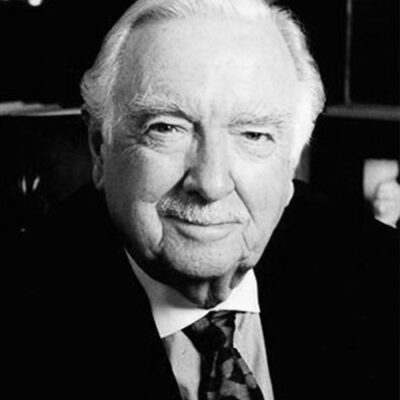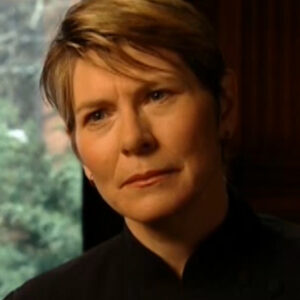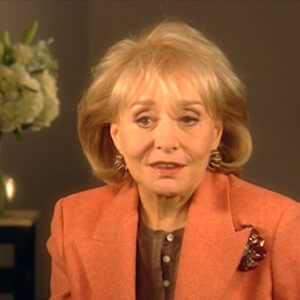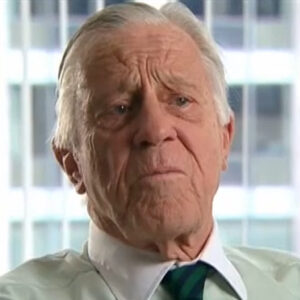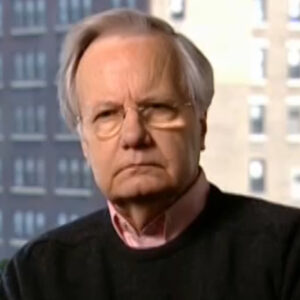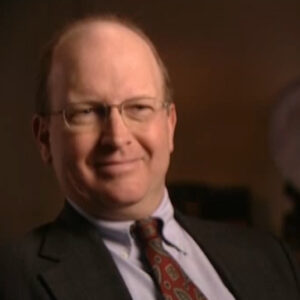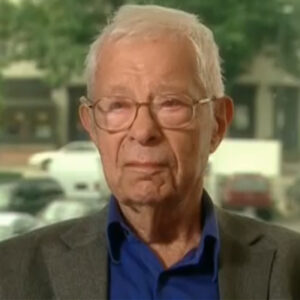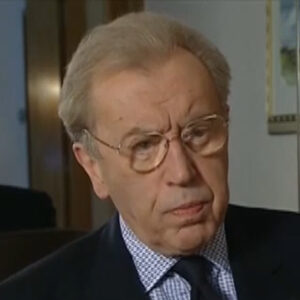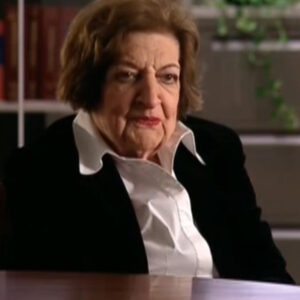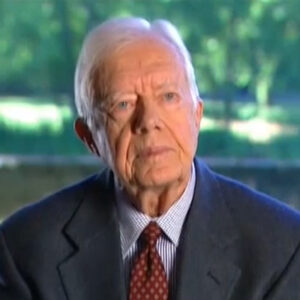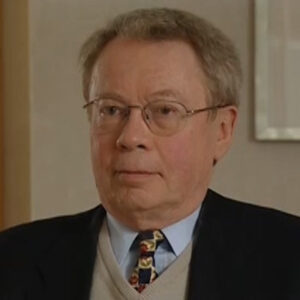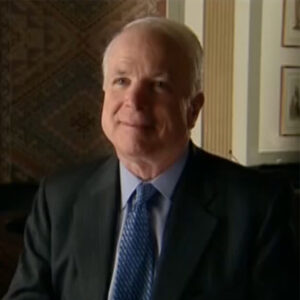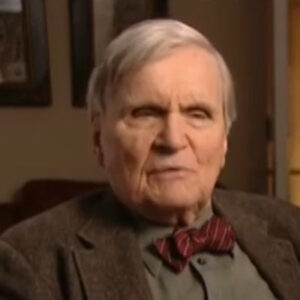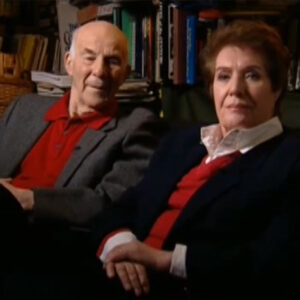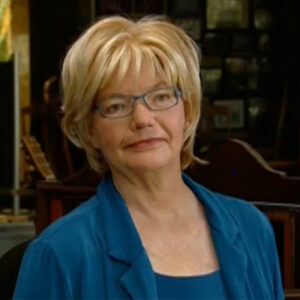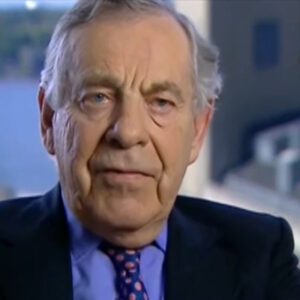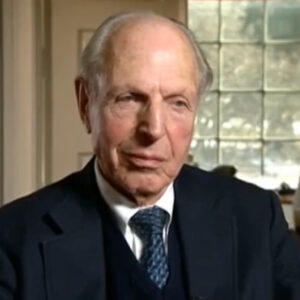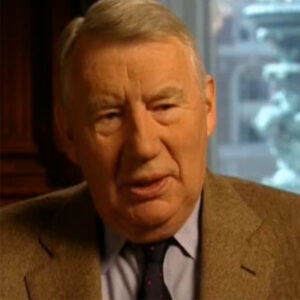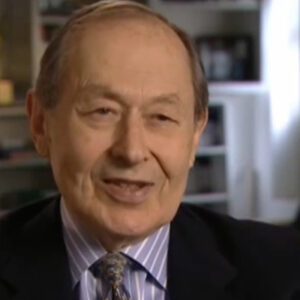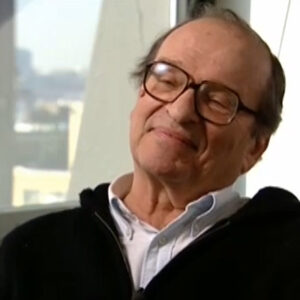Speaker Television wants action. Want movement. And it will not focus on slow, deliberative processes.
Speaker It will only go to where there is action, so it likes wars like the civil rights movement in the beginning, because there was action just as it was being born, the civil rights movement was being born, and they dovetail that.
Speaker It made it gave TV news a greater legitimacy.
Speaker But it’s easily bored. It doesn’t want a legal process. And so pretty soon, human behavior begins to conform to what television wants. There’s a great line of one of the CBS producers are getting a call from one of the porters in the field and they ask what she’s doing. And she says, trying to decide whether or not to cover a demonstration. That would not be a demonstration if I were not here. And so everything is faster. Everything has to action, have action. And it makes. The society in the long run is not so nice.
Speaker I would have said 20, 25 years ago when I wrote my book. But it makes the society less civil. We clamor more.
Speaker We argue the louder you are, the more likely you are to get on television. The kind of civility in debate which might have existed at the start of a television era is gone. And now, if you go on one of these alleged news programs, they really debate programs. They want you to really mix it up and say insulting things to each other.
Speaker Now, to a lot of Americans, Cronkite was synonymous with a chunk of the 20th century American history because he was one who told us about civil rights, the death of president, Vietnam War and the space race.
Speaker You talk a little bit about what we’re trying to get as a little bit about the relationship of Cronkite in the beginning of television and how effective.
Speaker Well, it’s really as if Walter and national television were born on the same day. I mean, it’s not true. He came to television as a fully grown, highly professional correspondent who’d been a really quite good reporter in World War Two. But his career curve and the curve of network television absolutely dovetailed.
Speaker And. And he held that position for so long under such vastly changing circumstances, so many great news events from the rather quiescent 50s into the 60s, into civil rights movement, into the war in Vietnam, through the space age, through the assassination of Lyndon Johnson, right through into Watergate. But it seemed to most people that as they got their first television set, Walter and CBS News had joined their family coming in every night. And what Dan Schorr once called a national evening sounds back in an age when network news before the proliferation of stations and the coming of cable was a great deal more important than it is today.
Speaker I just want to pick up a little.
Speaker It is that he was born in television at the moment that the evening news shows arrived. It wasn’t true, but it surely felt that way.
Speaker Just one thing you said, the assassination of Lyndon Johnson, you the essentially just change the framing.
Speaker Look, I want to say decried the assassination of John Kennedy and the ascension of Lyndon Johnson.
Speaker Perfect.
Speaker The man who delivers the news of the assassination of president. Is an extremely important person because it’s one of those first moments where television absolutely takes over the play from print. Television is faster than print. Television has an immediacy that print can never match. And so when the first bulletins come in that John Kennedy has been shot. In Dallas, people go is the first time that’s happened, happened many times, and go and turn on the television sets and they get their news. And so the person who delivers this heartbreaking, tragic story to the whole country and tries to bind the country together in a very dark hour is the anchor man of a network. And Walter was very good at that.
Speaker Do you feel that Walter had to tell us that in a way helped us through these many turbulent years? Do you feel that in a way. The way he was, the way he presented himself, made the American public feel more secure, that in these tumultuous times there was Walter.
Speaker Well, he was very trustworthy, man. And people really did trust him. And he’s a very decent man. He’s he’s a great American center. I mean, if he were looking for the center of the country with and the place which is believed to have our greatest virtues, you go to the Midwest and there’s Walter of St. Charles, Missouri, with the lack of pretentiousness, the innate decency, the innate honesty, the simple values, the good basic values that we think the West has and which I think, by the way, it does have for a variety of reasons. So he created an enormous aura of trust over a very long time. And he felt. Like an average American, although at a talented one, giving the news to his fellow average Americans, he was one of his great strengths. Walter was always a bit more sophisticated than he showed. I mean, he knew how not to try and be too big for his britches not to try and be too fancy. How to hold off on opinions. He was the old wire service guy, the old UAP guy who just did the story in contrast to the Murrow people who had been picked for analysis. They were great opinion shapers. They were very thoughtful, Walt. They all looked down on Walter in the beginning because he was just the UPI guy. But that became a critical kind of bond with ordinary citizens that he wasn’t fancier than they were. He didn’t use fancy words and he didn’t have opinions that got between him and his audience, his simplicity. And I think he was aware of and I think Walter is very shrewd and I think he knew how to not only to rein in his ego, which was very important. He never had a one of those gargantuan television egos, which we live among today. But, you know, he really still went about it as if he was an AP or UPI reporter and he edited it himself. I think very skillfully, emotionally.
Speaker Now, what do you think was the relationship between Murrow and Cronkite? I know a couple of situations where CBS tried to marry the two and have them report together. And can you talk a little bit about the relationship of Murrow? Cronkite?
Speaker What I didn’t think was I don’t think was a very happy relationships out of Murrow and Cronkite.
Speaker They, I think were very different men and he.
Speaker Mara was an innate sophisticate. I mean, he wasn’t a big city boy. He came from the state of Washington. He’d gone to Washington State University. But there was an innate sophistication and innate elegance, high brow that was there from the beginning. And he hired people who were sort of journalist philosophers, and he had a very shrewd sense of talent. He picked out very good people and he wanted the young Walter back in World War Two days, Cronkite and Mara would never have been very happy, very long being a wire service reporter. I mean, he was really always tried to get the implications of the story. What does it mean?
Speaker Walter is quintessential Midwest. He’s quintessential wire service, the straight American unvarnished. He’s very good at presenting the story of knowing how to suppress the ego.
Speaker And there was never going to be a natural connection, particularly I think in the early 40s and during World War Two. Murrow spotted that Cronkite was one of the best reporters in London working for UPI, going out on covering World War Two. And he offered him a job. And about that time, Harrison Salisbury was the great New York Times reporter. But was it was yuppy, found out about it, sort of doubled Walter’s salary.
Speaker And Murrow couldn’t believe that anybody who would have preferred A, stay with you, B, what he could work for the enormously influential August.
Speaker Powerful and rich. CBS, which would pay probably four or five times as much, I think there was a little tension point from there.
Speaker And I think Cronkite always thought the Murrow people looked down on him, that he wasn’t sophisticated enough. And I think he had his resentment over them. I mean, not necessarily of Murrow, but some of the Murrow people, Eric Sevareid would not be a man who would do it would work very hard to hold back his sense of superiority and snobbery.
Speaker Now, tell me a little bit about Severide.
Speaker I think when when were the job was opening up to be the anchor man, rather belatedly, because in the beginning, you know, Cronkite got to be anchor, got to television because none of the Murrow’s boys wanted it because TLT radio was bigger than television. By the time they understood from the I think it was the 52 convention on television was very important.
Speaker By then, Cronkite had done a very good job at the 52 convention. By that time in Sevareid got interested. Cronkite really was a better fit for the job and Sevareid wanted it and didn’t get it and was furious and and always spoke. Always bad mouth. Walter.
Speaker Now, the fact the 52 convention, did that change the way the conventions? I mean, how all of a sudden you had the convention, right, on television. How did that change the political process?
Speaker Fifty two changed it because 52 was really the beginning. Of a television political process. It really flowered in 1960. But in the end, there still weren’t that many television sets. In 1952, and it was a moment where television was really not a creator, but an observer.
Speaker I mean, it wasn’t all scripted for television as it later became balloons to be released at seven oh one seven oh three to seven.
Speaker Oh, nine.
Speaker Introduce vice president’s wife. I mean, everything scripted down to you could still have unscripted moments. Everett McKinley, Durkin, Dirksen, looking down at Tom doing and said, you let us down the road to defeat once. Don’t do it again. I mean, it’s wonderful, angry scene.
Speaker That was a raw convention, the Republican convention, because of the collision between the Taft and the Eisenhower forces. I mean, it was really two Americas into raw combat. So television was an observer. They which anyone who knew anything new, the might of this instrument was going to grow and become more powerful. More television sets, more people getting their definition of news, their window on the world from it. That Life magazine would be, which had served that purpose pictorially and news before, was going to decline. Print was going to have to make its accommodations to assume that television was faster and print would have to explain to people what they had just seen. It was written out. If you were smart as far back as 52 and in 60, you could really see and you could see it in 56. To Frank Clement, the governor of Tennessee gave an introduction. I gave the keynote speech at the Democratic Convention in 56, and he was sort of this golden orator. And he gave the last radio speech at an early television convention. He went on much too long, much too overheated. Television would prefer cool and understated. And you could certainly see it in the jump in John Kennedy’s campaign in 1960.
Speaker By then, it was a done deal.
Speaker Now, in 1964, Cronkite, who had been doing the conventions, was fired. Can you talk a little bit about what happened in that in the 64 and also the, you know, the cup, the heavily Brinkley coming in?
Speaker Well, I’m a little bit soft on this. I’ll do the best I can, but.
Speaker Atthe moment.
Speaker I think there was a momentary feeling that Walter was a bit passé, that he may be done it too long. Huntley Brinkley, the shared anchor, was coming on and Fred Friendly wanted something new for CBS. Maybe there was some of the old Murrow tension because Friendly was a Murrow guy, but they were squeezing him out.
Speaker I think it was at the year they had the mud trout team. They were going to they were being imitative instead of trusting to their own instincts. The replacement didn’t work. And inevitably, Walter got called back out of the bullpen and went back. And if they thought he was too old, then he went back for about another 20 years.
Speaker He’s very durable. Television is something because it is so speedy, because it is so given to fad. It likes a new fad. It is a great injector. It gives you a moment and then hits the ejection button and you don’t even know you think you’re still ascending and your time hasn’t come and gone.
Speaker What Walter’s qualities were because they were non television qualities. He didn’t have the great hair. He was never inauthentic. He was always true to himself. He became wonderfully durable. And it was because he was authentic and never tried to be anything else. I mean, what made him really, in a way in the beginning, not a natural for television? He wasn’t a pretty boy. He didn’t have a kind of glossiness that they love now. And he didn’t have a stick.
Speaker Helped him to endure.
Speaker And the American people knew that they knew he was authentic and he really is, you know, he’s a really good man. He’s a really I mean, the great thing about Walter is. He is up close. Pretty much what he seemed like on television, and I think the American people got that. I mean, it wasn’t like there was a secret.
Speaker Walter Cronkite still with ego and vanity and ready to destroy and inhale all the people around him and eating up the bodies of would be competitors.
Speaker He really was what you saw at the beginning of reality TV in some way. No, no, no, no. Not that kind of reality.
Speaker Let’s go to I’d love to talk about Watergate.
Speaker Are we doing what you think?
Speaker I have not I’m not going to be as good on Watergate because I you know, I haven’t refreshed myself, but I do the best I can.
Speaker I just I just want to say that I haven’t asked because I rather just.
Speaker I I wanted to just if we could briefly talk about Watergate and. The effect of Walter and deciding that he wanted to do. A kind of special that would help inform the American public about Watergate. Can you tell us a little bit about the story of Watergate and what that report affected, that we’ve caught that guy, Joe.
Speaker What’s his name? Joe. He might be around the guy who do as his producer. Yeah, I’d forgotten his name. We just got his name from. Yeah, he’s in mine. Yeah. And I’m trees around in New York, and he’d be very good. He was really in on all that.
Speaker They did something really quite courageous in Watergate because by then. The power and the affluence of the networks. We’re clear how important it was and how rich it was and how much money you made and how angry the government under Richard Nixon was about.
Speaker Network news that he considered the enemy that probably every president really wants to control. Network news. I mean, I think de Gaulle once said, you know, printers against me, but television is mine. They all want to identify the agenda. You add to that. Nixon’s ideological thrust and his innate resentment, I think, of the media in general and the particular nature of the story where the president of the United States had been caught in a crime against his fellow citizens. So the value of the network and the risk is great because you’re going to cover a president who’s committed these crimes and yet is a tensely vengeful enemy who has the means of leverage against your institutions through the FCC.
Speaker And yet Cronkite and his producers decided to take this very fragmented story, which did somehow register in the minds of 180 was very complicated to do something really kind of unusual, exceptionally long takeouts. I think one of them was 14 minutes, practically two thirds of the broadcast to make it coherent, to bring it together so that ordinary people, the kind of people he had grown up with, insane Joe, would understand the story in genuine context. And I think it’s a great piece of reporting and it’s a rather heroic deed. It’s really stepping out and putting your news organization and your own reputation as Mr. Decent Guy on the line, because inevitably millions of people are not going to like you doing this. They’re going to feel that you’re crossing a sacred line and becoming, I suppose, more prosecutorial. So it’s something really quite admirable from a journalistic standpoint and probably something he had a lot of doubt about doing and probably something he must feel very proud of having done.
Speaker The fact that he that he did a special, that he did two 1/2 hour special reports, you feel in a way, even though the reports were as just giving the facts and not editorializing, you feel the fact that he gave that attention, in a sense, was a statement.
Speaker What do you do? There’s a quantum jump over the usual. Two minute peep piece of reporting to devote that much of.
Speaker Of a broadcast on something so powerful, it is a genuine major editorial decision. Everything in you know, people go around thinking and say, I’m an objective journalist. Everything’s subjective. New York Times, everything they do is subjective. What eight stories they put on the front page. What 30 stories we put inside. What hundreds stories they don’t cover. Which one hundred reporters they choose to hire as opposed to the thousand. They don’t choose the decision to do these extraordinarily long reports. It’s a major editorial decision. It isn’t editorializing, but it’s a huge, subjective decision saying, in effect, our normal processes don’t work.
Speaker We own we are not making the water clearer. We are, if anything, making it muddier. And we’ve got to find a new formula with which to do it. And it’s going to take time. And we’re going to put the organization at risk and we’re going to put our own reputation for alleged fairness at risk.
Speaker Now, one of the things that was really interesting about your book was that you talked about how the presidents from Jack Kennedy to Johnson Nixon, how they dealt with the press, how comfortable they were with the press and how not comfortable situation. Can you give us a little overview of of, you know, the comfort level each of these presidents had with television and the news and with Cronkite or that with well, with Cronkite or even just an overview?
Speaker Well, I think Dwight Eisenhower was largely immune to the media. I think we were so sort of mosquitoes that eat would this long as we didn’t bite too often. I mean, I don’t think we came up on his radar. He had been the great general of the largest crossing the armada, the largest amphibious landing in the history of mankind. And being president of the United States was a step down. He was immensely popular. He knew he was popular. He was above normal political roles. He had a wonderful relationship with the ordinary American people. So the media was not something that bedeviled me. He was also quite centered within himself. I mean, part of the relationship of a president was the media is how harmonious you are about yourself. The less the least, the less harmonious you are, the more likely you are to have problems with the press. The more comfortable you are with yourself, the more you can sort of see this thing as a kind of natural process. Eisenhower also, I think, was a natural fit with Walter. They had known each other in World War Two. Walter was a World War Two guy, and Ike had a very good press corps there because he’s likable. And, you know, there’s not a lot of sturm and grong and angst. I mean, he really he, like Walter is what he seems to be, maybe a little shrewder and very good at sort of seeming less sophisticated than he was. It was a natural fit. In fact, Kennedy used it was quite sure that Cronkite was a Republican. And the reason was because he whatever he turned on television seemed to him that Cronkite and Eisenhower were together. And he once told the Don Hewitt, I know he’s a Republican, but he’s always with Eisenhower. And you told him no. I think he probably voted for Eisenhower over Stevens and and probably for you over. Nixon Kennedy was really the new person with whom I think the most there was the most complicated and most interesting relationship because he was so good with the press. I mean, particularly the television was the first television president he understood, but he looked good that he could use it, that he could do these early life television press conferences, that his family was telegenic, that he could let the cameras in. And it resounded to his credit. And he was I mean, his friends were journalists. He understood something about the media, which is that it’s a good early warning signal. But the questions you’re getting from the reporters are really what the country’s thinking, although you’re getting it earlier. And he was terribly good on television and I don’t think he was as quite as natural if it was Cronkite. But, you know, he was good at it. He was good with print. And he understood early on how important television was, even in his 1960 campaign. He was able to midwife actually on the fly the importance of the old Democratic city machines, people like Dick Daley with the new power of television. How has it affected running in primaries? It’s just very good, natural politician and good with this new instrument, as Roosevelt had Benwood with Radio. Kennedy was good with television. It bedeviled Lyndon Johnson in part because he was always in the shadow of Jack Kennedy, who had just run rings around him in the 1960 primaries with Johnson that thought he would just take one second to that place.
Speaker This is really this.
Speaker Your game.
Speaker Yeah. OK. Go, go it be devil.
Speaker Lyndon Johnson in part because he was always in the shadow of Jack Kennedy, who had done so deftly and.
Speaker You know, Kate Johnson had thought in 1960 that he was a leading candidate. Kennedy was a little guy in the Senate. And by the time Johnson looked around, Kennedy had the nomination. And Kennedy had been so deft on television when John jauntiness assumed office. He was puzzled that he couldn’t do it. He was very much in Kennedy’s shadow. And he just did not know how to be natural. He would try one style and another style, your friendly president. You know, he the stuff that worked well for him in the Senate, taking someone out in the hallway and bending his arm and shoulder and working on him and making a deal did not work well on television or did it work well with the print? He was always trying to sort of manipulate print reporters in an unseemly way. I mean, Kennedy knew how to play them, how to appeal to the things that interested them to use the kind of almost fake candor. I mean, Ken Kennedy was very effective at being candid with reporters, almost off the record. And they like that, whereas Johnson was always trying to manipulate them in the.
Speaker Picked up on that Nixon ism.
Speaker A very different story, such a completely different story. There was so much anger in him and resentment in him, which inevitably focused on the media, which he decided was out to get him and the relationship, unless you were an ideological reporter who was already on his side. You know, one of the tiny handful of sort of guys who almost pulled by their papers to be protection and to get on with him. The relationships were always just a horror because of his own tensions, his own.
Speaker Instinct to manipulate the press and his belief that the things that the press was out to get him sort of a paranoia they’re up to. Well, you won’t have Nixon to kick around that famous statement and his inability to see the strengths, their weakness, what they were doing and why they were doing it and put it in place. Kennedy was very good at that. Eisenhower was not even. We didn’t we barely came up on his radar. And Johnson could never quite get it right.
Speaker But there was was there not a lot of conflict between Cronkite and No Cronkite one out? And in your book, you talk about how it came out and made a speech because Agnew had attacked the press. And was there a lot of tension between Cronkite and and the Nixon administration?
Speaker I think by the time. Did Nixon took office? The tensions between. The media and the presidency, which are now a constant because of the power of the media, because of the quantum increase in power that television granted to the media, even to the press, because in those days, print defined and television amplifies something within the New York Times. It would be on the CBS Evening News the same night. The struggle had gotten really bitter. And Nixon had really decided a new Agnew as an instrument, that he would try and isolate the media as a political enemy, that the media had because of Vietnam and Watergate might be in bad odor, particularly Vietnam and civil rights, that there were a lot of Americans who would be resentful of the activist, as it was believed, role of the media in covering the civil rights movement and that the media was vulnerable.
Speaker And at the very least, he could put it on the defensive and make it less aggressive. And I think to some degree he was successful. And what’s true is that there were a couple occasions, I think, where Walter got up and defended the media and the right to do this from that White House and the vice president, which was a very clear political assault upon the right of the media to cover, you know.
Speaker Charge Deschutes.
Speaker Now. Can you talk to me a little bit about the effect of Cronkite’s report when he after he had come back from the front, from the Tet Offensive? I mean, come on, come back and talk to the American people about what he observed and he made that statement. I gather it was at the end of his documentary, not on the evening news.
Speaker I don’t know if that’s true, but we have to think of Vietnam as the first war that was ended by an anchor. And Walter is. Critical in this, he would be he was a big World War Two guy and he was a POW of the brass and he wasn’t very sympathetic to a new generation of reporters who had gone out there and whose reporting was quite pessimistic. He he was bothered by their degree of alienation because he had not had that alienation in a very different war.
Speaker He’d gotten on very well with the senior people. And he was in a good war. He was the good war correspondent. But this was a bad neo colonial war that didn’t work. And CBS, in part because of Murrow and part of Cronkite, had a great team of reporters. The one thing you must understand about Walter was he headed. In those days, a great news organization. And the roots of that really went back to morrow and others at all, the bright young men and in time, women who wanted to go into broadcast news and wanted to go first and foremost to CBS.
Speaker And they had a great bench, NBC. ABC was not a player in those days. NBC had a very good sort of top five or six people, but CBS was sort of like The New York Times. It was really an ornament to its profession. And what it made what made it great was the bench strength that the number 15 guy from CBS, some young guy you might send out often the big boys were a little busy, was terrific, and not really showed in Vietnam where you had wonderful young reporters like Morley Safer and Jack Lawrence, who did brilliant work there reporting. And CBS became a kind of like an extension of the best of print reporting. Lyndon Johnson was absolutely convinced, for instance, that I was in cahoots with Morley Safer and that I was telling Morley what to report and how to report it. We’d never met. We met, I think, around 1967 or 68. But he Johnson, his paranoia, thought that there was this umbilical cord that connected us. Cronkite hadn’t with his general different generational attitudes had not been that sympathetic to these people. And they had sort of thought when he came out, I think on previous turns, he went to the senior military. You were the guys he knew and they showed him all their toys. And he he got on the team, in effect, that was the old guard and get on the team. And so when he went out for Ted. He was really shaken by what he saw. I mean, he could barely land the plane here. He went out of someplace up north with nothing but body bags. Here were the people worst. Here were the people who the senior military in Saigon telling him how well it was going and it was a victory. And that wherever he went, it was obvious that, A, it did work, it wasn’t a victory, and that we were in some kind of a stalemate. It didn’t work.
Speaker And what added to that was the fact that he was a really old friend of a wonderful senior officer, Officer Creighton Abrams, who was, you know, going to replace Westy.
Speaker General Westmoreland and great names was a tanker under Patton, a really wonderful officer, was in his own way alienated. He didn’t think it would work. And when Walter went to see him, he was extraordinarily candid with him about the degree to which Tet was a setback, about the degree to which the headquarters above him was not really understanding the war, did not understand the war. And that candor really shook and shaped Walter and made him, in the vernacular, doveish, more doveish. He had been rather hawkish and had accepted the norms. And now he was beginning to see the war as the younger generation did, that it was endless, that there was no victory in sight inside and that most of the senior military and its official announcement could not be trusted.
Speaker And then there is a great moment where he comes back to Saigon. I think he’s on the roof.
Speaker Of the caravel with this wonderful young reporter, Jack Long, Szechwan Haunch, going to great, great reporters of the Vietnam War. There’s a delicacy to him. No, I don’t think there was any television reporter who had a better instinct for the young men fighting the war than Jack. He had a kind of Huck Finn simplicity and he understood the men who were fighting it and they liked him and trusted him and he really got it. And then there’s this wonderful moment where Walter really talks to Jack. Jack is really not even that eager to be with Walter. You know, I think God I mean, I don’t want to hear his World War Two stuff again. And then Walter talks to him almost as a father, to a son. And it’s Walter at his best.
Speaker So what happened when he got. Do we have too much tape? Let’s change quickly. Yeah, OK.
Speaker I think Jack is really very special because I think he was, for whatever reason, particularly anguished by the war, I think it was a source of pain. Most of us who covered it knew how to sort of shut out. The pain is part of the professional job. You try and learn to deal with danger. You can’t do this unless you do learn to conquer your fear. And the other thing you have to learn to do is to shut out part of your emotional response. I don’t know that Jack ever did. I think it’s probably the attractive part of him. But he was in in real, genuine pain. I think it made him an acutely good reporter, acutely good observer, because he had a sixth sense of the mood of the kids who fought. And therefore, when he meets with Walter, it’s a great generational meeting because you’re meeting World War Two, a reporter who vowed who validated most of what happened in his war in Vietnam, someone deeply alienated by it.
Speaker Now, when Walter came back to the States, he then started working on a special on Vietnam. And I guess Dick Lot, someone who said, Walter, you need to express yourself. Can you talk about that story and the effects that that story had on the Johnson?
Speaker I think Bolton knew that he had to cash in some of his chips. You know, he had protected for so long. His objectivity or what is purported to be objectivity. He stayed within that narrow framework and had it served him well, served CBS well, and it’s fit the demands of the job and what people would accept. But every once in a while, you really have to earn your salary. And here was this. Traumatic moment. America is. Caught up, impaled on an unwinnable war. He’s the senior. Journalist in America, the most trusted, et cetera, et cetera, et cetera, all that stuff, and he’s been over there and he knows it doesn’t work and doesn’t and he knows it doesn’t work.
Speaker Not just from his own words, but that from really marvelous military men whom he trusts. I mean, one of the great things that people didn’t understand for a long time and Cronkite didn’t understand was that when they saw us reporting or read us reporting, we were the visible part of an iceberg of a lot of military men who were saying privately, it doesn’t work, doesn’t work, doesn’t work, can’t be done. And now for the first time, he understands that it isn’t just Jack Lawrence or Morley Safer who’s pessimistic. It’s the entire military machine other than the very, very top, which is which gloms onto Johnson and MacNamara and people like that. So he’s really shaken and he knows there’s a moment when you have to finally make the call that this is one of those moments, tet, the war, the country being torn apart.
Speaker And he has to shed his objectivity. And he does. And he says, in effect, it doesn’t work and we have to find a political solution. That’s when I said it’s the first time a war has been declared over by an anchor man. He does this special report. I remember watching it. I’d been lecturing down in Florida. I thought it’s over. And among the others who thought it was over was Lyndon Johnson. Lyndon Johnson, like Walter Cronkite, trusted him. He thought Walter was different from other reporters. Lyndon didn’t like reporters. He said if someone like me, that I was a traitor to my country. And he always thought we were out there, Kai, that we were willing to, in order to advance ourselves, hurt the country. Unlike Lyndon was going to do good things for the country and when hurt the country. But he thought Walter was really an honorable man and thought of the country as he Lyndon thought of the country. And when Walter went on and did that report. Johnson turned to George Christian and his press officers, principal press office said, I’ve lost the country because if I’ve lost Walter Cronkite, I’ve lost Mr. and Mrs. Average Citizen.
Speaker I mean, Walter to him reflected an ordinary, not just a powerful anchor man, but the decency of an ordinary person. And he sort of knew then that it was over.
Speaker Now, what happened to Cronkite? In terms of when he left the anchor position, do you think that he left at the time when he I mean, was it the time he was meant to leave or what? What is the story behind his leaving the anchor position at CBS?
Speaker I don’t know. Inside story, I think I. Mimi, what year does it does rather take over? Do you remember 81, 81? OK.
Speaker I had a dog chronicling CBS. By then, I don’t think Walter wanted to step down.
Speaker But I think the pressure right there was a perception that Walter was getting older, rather, was sending another network, might make a bid for rather. And I think he was partially squeezed out. I mean, I think once he knew that, it was probably time to go. But I don’t think it was done, in his view, in an attractive way.
Speaker And the problem is, once you don’t have that job and that power, you’re effectively powerless at the network. They may promise you that you can do documentaries and do this and do that and whatever. But they don’t really make good on that process. And I think he felt pushed out the door a little sooner than he wanted to be. And I think he was also in the years to come. Shocked by the deterioration of CBS News as a series of new corporate owners came in and had too little respect for the values of the newsroom. I think he was appalled by that.
Speaker OK, just can we start tape one second?
Speaker You know, who’s Susan’s Oransky, I try her. I know she’s well, she’s the person in broadcast news is built on. She’s sort of the last person there. She might be good on it anyway.
Speaker All right. Here’s the few few questions we have left. CBS corporate had one agenda and the news department had another. What was the difference between them and what matter to CBS corporate? What mattered to CBS News?
Speaker In the years that Walter was an anchor man. The corporation. Always had an uneasy relationship with the newsroom because the newsroom really didn’t make money and it put the network at risk.
Speaker And every year the profits were greater. I mean, as you went from radio to television, the minute got to be more and more valuable. CBS News was the original ornament and gave CBS. It’s early legitimacy. The great moment when Murrow covers the rise of Hitler in World War Two, but it was great popular war and so being a great reporter of a popular war does not cause any contradiction between the newsroom and the corporation. And that’s why, I mean, Murrow could cover a war, do it brilliantly. Be the best reporter of the war and still get a big corporate news job, unlike reporters who covered Vietnam, who would put themselves in conflict with corporate power because they were bringing bad news. So the tensions are going to systematically increase. And Walter presided at that time and the minute is getting more valuable. The minute you get the instrument is becoming more powerful. What it does or doesn’t do has more and more effect upon the president, who gets angrier and angrier if it doesn’t agree with him. And so the conflict, which is a conflict between the newsroom and, say, the government, the United States also becomes in voluntarily a conflict between the newsroom and the corporation. And the corporation is not happy with harvest of Shame and under Murrow or happy with the McCarthy documentary and Friendly and Murrow have to pay for the ad out of their own. I mean, that’s a sign of things to come. And it heats up even more in the 60s because the corporation thinks the newsroom.
Speaker It is dangerous and cost the money can get them in political trouble and Stanton caught constantly on both sides. I mean, it’s a great moment when Morley Safer does his great reporting from Kaminey about the Marines setting fire to the hooches. And the next day, Lyndon Johnson picks up the phone and calls Franks and.
Speaker And. Wakes him up at about probably five, 30 instances. Who’s this? Who’s this? And this is your president, Frank.
Speaker And your boy, the American flag yesterday. I mean, it that’s.
Speaker And you could always sense I was told that Frank’s dad had no great affection for Morley Safer in the years to.
Speaker Well, do you feel that based on what you just said, do you feel that in a way? I mean, what happened with. He was like king of CBS. And then when Walter came and then there was a shift and then finally Murrow sort of went out of the picture. Do you feel that in the way the CBS corporate. Decided that they needed someone who was less of a troublemaker and brought in Walter.
Speaker No, I think the kind of freedoms. Almost unedited.
Speaker That Murrow had when he first came upon the scene as the extraordinary Ed Murrow covering a very popular war and doing it for radio.
Speaker We’re not going to exist that much longer, that the news that the corporation was inevitably given the power of the instrument and the absence of the instrument going to try and set up rules which would discipline and keep the instrument from making the corporation vulnerable in that sense. Walter. Coming out of wire service with his in disciplines, with his.
Speaker Greater instinct for what would be called objectivity, as opposed to the Morreau guys who came out of radio and we’re sort of journalists, philosophers, was a better fit for the new era, which demanded more careful reporting limits. You could not be excessive. You could not. Make it too personal. You had to use more restraint. It wasn’t that we kick Morreau out and replace him with Cronkite. Was it a new instrument was on the ascent. And Walter was the perfect fit for it.
Speaker And a changing kind of power. And it worked. Out of his. Professionalism, his hard work, his innate decency. He really fit the instrument.
Speaker And he and the instrument were coming of age at exactly the same time. It’s an odd kind of thing where, you know.
Speaker He was most Americans really learned of.
Speaker The evening news and learned of Vietnam and learned. Of the civil rights movement and learned of Watergate. With Walter Cronkite is the man who ushered it into their homes. And did it with great professionalism over a very long time. And was, I think, absolutely true to himself. I mean, it’s one of those really things that worked right, man? Right place. Right time. Right instrument.
Speaker Five more minutes.
Speaker Cronkite was actually quite fierce about the about press duties and freedoms. He said that Vietnam War belonged in people’s living rooms. He said that people had a duty to know what was going on in the world. He said that journalists should never consider the effect of what they report, only whether it’s true or not.
Speaker If you come from print and you began covering. Events with the civil rights movement and the Vietnam War. It’s a statement that we all subscribe to. We’re not in it for popularity. I mean, I think Walter was.
Speaker Amazing in that he was able to be a conveyor belt.
Speaker Of news, much of it bad, into American homes for a very long time without losing his popular popularity. But inevitably, the more you are the messenger or usher and other messengers. The more you’re going to risk your popularity.
Speaker I mean, you cannot do what we do. And be popular. It’s a different era and we can gain people’s respect, but we can’t gain their love or popularity with them.
Speaker But I guess what helped Walter was his man coverage so that he was having all this terrible news. But at least there was something that was I don’t even know if the news.
Speaker I don’t know that the astronaut coverage of the space program.
Speaker Helped him that much. I think it was who he was, that he was straight and didn’t play games and was by and large. Honorable and trustworthy, I don’t think. In the end, maybe I maybe I’ve changed my being. I don’t think that doing I mean, it gave him a bit of an incarnation as a cheerleader for something that worked. But in the end, I think it was other qualities that served him well.
Speaker And in your book on page 415, you describe the scene in 1970 when Cronkite walked into a meeting of the CBS affiliates to standing ovation.
Speaker Do you remember he was a wizard 1970 or. It was. I think it was.
Speaker Well, it’s the moment. It’s. It’s. It’s a moment, I think, right about the time when the Nixon White House with Agnew has begun to strike out at the media, at the networks and particularly CBS, because it’s the most aggressive one and it’s an orchestrated. Campaign, and I think they’re trying to make the affiliate stations nervous. And CBS holds one of these big things and it brings out some of its chief people and there’s a smattering of applause as each is introduced and then they bring out Walter. And the place goes crazy and there’s wild applause. And it’s just he got that wonderful thing. I mean, it’s sort of like Eisenhower in a way. I mean, if there was bad news, people would separate Ike from it because they trusted him. If there was bad news, people separated Walter from it because he had created so much goodwill and trust over so long a period of time. So he was exempted. From the part of that institution that they didn’t want, you know, whether that exemption would last rather is another question.
Speaker But it lasted at that moment.
Speaker And my last question is, where do you feel Cronkhite fits in in the journalistic history?
Speaker I think we were really lucky to have Walter Cronkite at a moment. When television was new and the values were being formed. That he was so good and straight and honorable and decent, a man who did this job, did it well, controlled his ego, understood his relation both to the news and to ordinary Americans, and really kept the kind of journalistic faith in the face of what could be destructive in terms of ego, fame, money. Other people get caught up in that and lose a sense of who they are. And Walter really kept to the disciplines.
Speaker Kept being a journalist. In the end, he exited as he had entered it, as a really fine journalist.
Speaker And he is the last, isn’t he, the powerful?
Speaker I mean, he had it, but the audience is so fragmented now. I mean, there are people who do it who are as good, as intelligent, as hardworking. But the audience shrinks because there are just so many more options now. I mean, in those days, it really was, as Dan Schorr says, a national evening salons. You know, the country gathered around those three networks, actually, really almost two.
Speaker And what Walter said or what Huntley and Brinkley said or who they put on mattered. And there were no Hicks in America anymore. The people in Billings, Montana, were seeing what the people in Staten Island were seeing and the people in the Clearwater, Florida. And the people in. San Diego, California. I mean, it is a moment of bringing the nation and binding it electronically. It’s an extraordinary moment.

